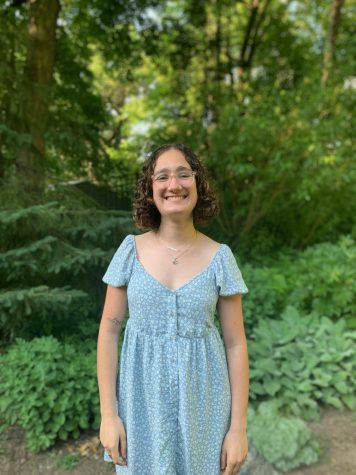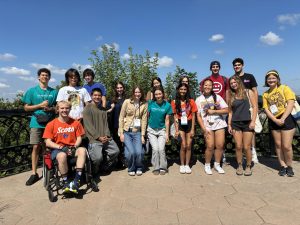New professor Christine O’Connell explores rainforest ecosystems

September 19, 2019
Christine Sierra O’Connell, a new assistant professor of environmental studies at Macalester, has a passion for studying tropical rainforest ecosystems. O’Connell is an ecosystem ecologist.
“[Ecosystem ecologists] look at how ecosystems function holistically,” O’Connel said. “So what I study is how tropical forests are changing in a globally changing planet. I’m a tropical forest and global change ecologist.”
O’Connell received her bachelor’s degree from Stanford University in earth systems with a biology focus and her Ph.D. in the department of ecology, evolution and behavior from the University of Minnesota. After receiving her Ph.D., she completed her postdoctoral research at the University of California Berkeley in their interdisciplinary environmental studies department.
O’Connell was drawn to Macalester’s strong focus on internationalism and the opportunity to work with undergrads at a small liberal arts college. O’Connell conducted all of her research outside of the United States, so she wanted a school that values global research.
“Macalester has a really long history of really focusing on the internationalism side of its mission, so that felt like a really natural fit too between my research interests and, in general, student mentorships interest here,” O’Connell said. “Coming to a place where there’s a big focus on looking outside the US felt like a really natural connection.”
The widespread optimism O’Connell felt from the students on campus was another factor she considers to have brought her to Macalester.
“My impression was that students are very optimistic at Macalester, and I study climate change,” O’Connell said, “I think it’s hard to study climate change without being surrounded by people who really feel like they can make a difference and they want to make a difference.”
O’Connell’s research focuses on tropical rainforest ecosystems in Central and South America.
“[My research] looks at two big areas.” O’Connell said, “Which is deforestation for agriculture, and I have mostly worked in the Brazilian Amazon in that arena. The other half of my research looks at, as the climate is changing, what does that mean for tropical rainforests? Most of my research there is done in Costa Rica.”
O’Connell’s travel partner in the tropics is her dog Luquillo, who is named after one of O’Connell’s long-term research sites in Puerto Rico. O’Connell calls him her “rainforest dog” because he loves to run and hike in rainforests with her.
There are many factors that led O’Connell to study tropical rainforests. The tropics are beautiful and enjoyable to hike and explore, but they are also a traditionally unappreciated academic discipline.
“In terms of the tropics, they are historically understudied because of a lot of factors like systemic inequality across the globe, and that it’s very logistically difficult to do work in tropical rainforests, especially in comparison to grassland,” O’Connell said.
These circumstances make it difficult for scientists to study the tropics, but tropical rainforest studies are becoming increasingly more important in the wake of global warming and climate change.
“[Tropical rainforests] are ecosystems that are extremely vulnerable to climatic change and global change and that means that it’s very important that we study them and not many people do,” O’Connell said.
At her research site in Brazil, there is little boundary between rainforest and agricultural land (usually soybean fields). In the soybean field where O’Connell worked, she encountered many wild animals. O’Connell said her favorite animal sighting was a tapir “[which] sort of look like a warthog with a bad elephant snout. All of the time, they are chilling out in the soybeans fields because soybeans are relatively nutritious.”
In addition to the tapirs, O’Connell also saw some animals that people more commonly associate with the rainforest.
“I once was at a place where a jaguar had attacked and killed a porcupine. There were porcupine spines all over this tree with all of these gouges on it [as well],” O’Connell said.
O’Connell is excited to teach agro ecology and ecosystem ecology in the environmental studies department next semester.
“Agro ecology is the science side of agriculture and the environment. Ecosystem and ecology is a big-time, upper-level science class,” O’Connell said.
O’Connell has only been a professor at Macalester for approximately three weeks, but she had a quick response when asked about her favorite part of working at the college.
“So far? That’s easy,” O’Connell said, “getting to know the students.”












